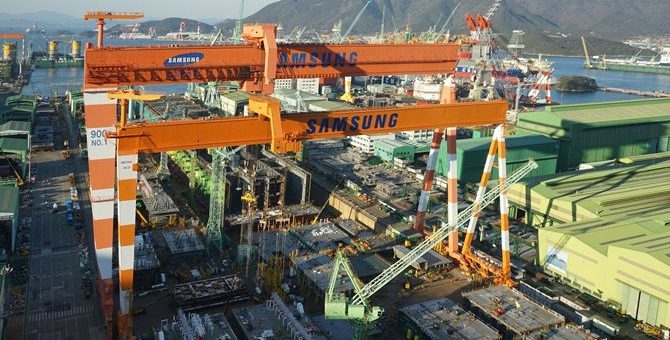In line with a downward trend in South Korean shipbuilding industry, Hyundai Heavy Industries Co. and Samsung Heavy Industries Co., both ranking at the top of the world’s largest shipbuilders, announced massive deficits in the second quarter of 2018.
Hyundai Heavy Industries announced Monday a total of 175.7 billion won (US$154.87 million) in consolidated operating losses for this period, although figures were up 42.9% from the first quarter. HHI’s sales also increased 2.7% to 3.12 trillion won (US$2.75 billion) and its net losses decreased 7.5% to 233.7 billion won (US$205.99 million), Business Korea reported.
Samsung Heavy Industries announced on the same day that its consolidated operating losses in Q2 2018 were about 100.5 billion won (US$88.59 million), up 100% from the previous quarter. Its sales stood at 1.35 trillion won (US$1.19 billion), while its net losses were estimated at 142.7 billion won (US$125.78 million).
Although the domestic shipbuilding industry has been suffering in the last decade by global economic downturn and Chinese competition, vessel orders have started to show an overall improvement. However, performance is expected to be difficulty restored at the moment, due to a rapid rise in materials prices.
Last week, the Korea Offshore & Shipbuilding Association demanded that steel firms freeze the prices of thick steel plates, as any price increase will threaten their survival.
South Korea hosts the world’s three largest shipbuilders by sales: Hyundai Heavy Industries Co., Samsung Heavy Industries Co. and Daewoo Shipbuilding & Marine Engineering Co. The companies have announced several measures in the last year to encounter financial crisis.
Earlier in June, Hyundai Heavy announced that it will suspend work at its offshore facilities shipyard in August, amid lack of orders, while it has also cut its workforce in the offshore sector by one third. Meanwhile, about 4,000 employees have left the company under voluntary retirement programs in 2015-2017.
Samsung Heavy has also announced earlier this year that it would cut the number of its executives, due to declining orders.




























































